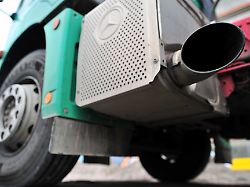EU climate package slowed down
Wissing blocks CO2 standards for trucks and buses
February 7, 2024, 6:02 p.m
Listen to article
This audio version was artificially generated. More info | Send feedback
Not even the auto industry understands this blockade: Federal Transport Minister Volker Wissing is against a European Union package that sets CO2 limits for trucks and buses. The reason is the same as when he said no to the end of combustion engines.
Germany is once again slowing down due to an FDP blockade of the EU’s climate protection package. The federal government was unable to agree on a common position on limiting CO2 emissions from trucks, government officials told Reuters. Government spokesman Steffen Hebestreit said that, as far as he knew, the planned vote in Brussels on the project would now be postponed until Friday. Neither the lead environment ministry nor the transport ministry commented on the reasons for postponing the package, which had actually been negotiated long ago.
However, government officials said Transport Minister Volker Wissing had surprisingly announced resistance. The Member States, Commission and Parliament had already agreed in mid-January with Germany’s yes. According to this, new trucks from 2040 should emit 90 percent less CO2 compared to 2019; more precisely, 90 percent should be emission-free and therefore primarily electric.
According to government circles, Wissing now wants to ensure that climate-neutral so-called e-fuels can be taken into account. Without an agreement in the government, Germany will have to abstain, which seems like a no vote. Italy wants to support the project and is fighting for biofuels to be credited, although this was already rejected in October. Together with some Eastern European countries there would then be a blocking minority.
No support from business for Wissing
On the one hand, Wissing’s approach is reminiscent of a year ago, when he blocked the fleet limits and the end of combustion engines from 2035. Back then, too, Wissing campaigned for e-fuels. Ultimately, the decision was made to phase out combustion engines. However, a separate e-fuels category for cars, as envisioned by Wissing, is still open. Most recently, the FDP ministers in the government blocked an agreement on the EU supply chain law.
The environmental and transport organization “Transport & Environment” was angry. The department head for commercial vehicles at T&E Germany said: “After the supply chain law debacle, Chancellor Olaf Scholz is in danger of being paraded by the FDP for the second time in a week,” said department head Kim Kohlmeyer. The FDP’s blockade practice threatens to embarrass Germany as an unreliable partner within the EU.
Unlike the Supply Chain Act, however, Wissing has practically no support from business this time: The Association of the German Automotive Industry (VDA) praised the regulation on limit values that had already been agreed in the EU and called for a quick agreement: “Reliability is for German companies Automotive industry of great importance.” However, it is also important that a sufficiently dense network of electric charging and hydrogen infrastructure is available in Europe. “More commitment and speed are urgently needed here,” explained a VDA spokesman.
It was said in industry circles that the industry was upset with Wissing. The truck manufacturers from Germany wanted planning security and had already intervened with the Chancellery. Another critical aspect of the project is that, given the upcoming elections in June, the EU would have little time left for a new compromise. The fleet limits for trucks are a central and one of the final building blocks of the EU climate protection package “Fit-for-55”.
